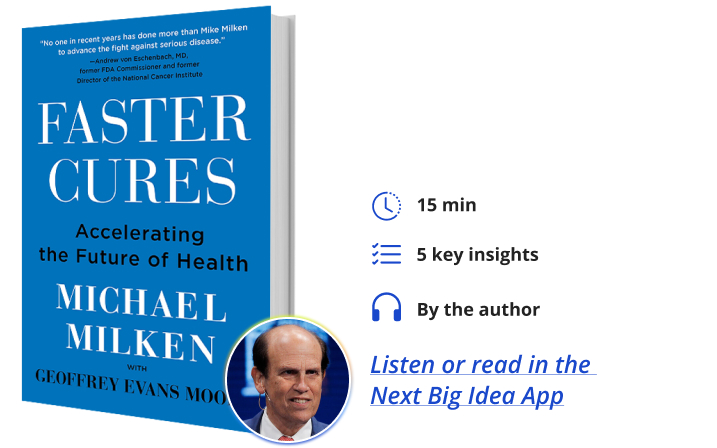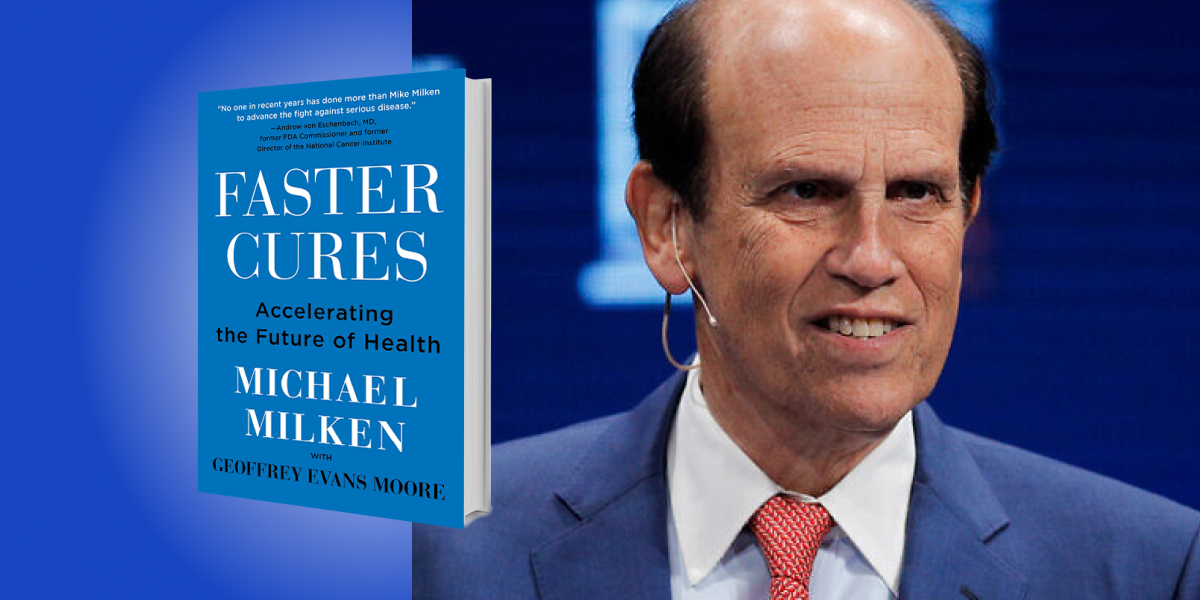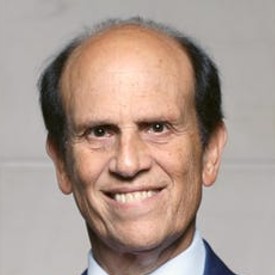Michael Milken’s career encompasses medical research, education, public health, and access to capital. His 1970s philanthropy expanded in 1982 with the establishment of the Milken Family Foundation. After two decades of actively supporting medical research, he became a patient when he was diagnosed with terminal cancer in 1993. Milken also chairs the Milken Institute, a widely respected think tank. Over the last three decades, he has increased his focus on making the research process more effective and efficient. A Berkeley graduate, he earned his MBA at the Wharton School.
Below, Michael shares five key insights from his new book, Faster Cures: Accelerating the Future of Health.

1. Science has triumphed.
As recently as the 19th century, people suffered through gruesome surgeries without anesthesia, childbirth without antiseptic procedures, and all manner of terrible infections. Fortunately, medicine has advanced from that dark past to the prospect of a bright future.
At the height of the 1950s polio epidemic, economists predicted that the twentieth century would end with America spending $100 billion a year on “iron lung hotels.” Diagnosed with lung cancer in 1964, the actor John Wayne told the world he had “the big C” and everyone assumed his death was imminent. Yet, he lived another fifteen years and made more than twenty additional movies. In the 1980s, one analysis estimated that by the year 2000, AIDS patients would fill half of all hospital beds. And in 2020, the COVID pandemic instilled such fear that officials in California speculated about two million future deaths in that state alone.
Science met these challenges in the form of the Salk and Sabin polio vaccines, public health campaigns, statins, anti-retroviral cocktails, advanced nutrition, genome sequencing, immunotherapies, monoclonal antibodies, mRNA vaccines, non-invasive surgeries, powerful new diagnostic scans, artificial intelligence, and CRISPR gene editing. These and other advances make me tremendously optimistic about the future of health.
2. History’s greatest achievement.
The greatest achievement in the history of civilization may very well be the 20th and 21st centuries’ worldwide extension of life spans and improvements in quality of life. You can understand how remarkable this is by comparing the rapid progress in the last century to the slow advance of longevity over four million years since the appearance of our pre-human ancestors.
The early pre-humans survived for about twenty years. By 1900, people throughout the world lived an average of thirty-one years, although it was forty-seven in the United States. Of course, that average was reduced by the prevalence of infant mortality, especially in poverty-stricken developing nations. Still, it’s surprising that in the entire development of our species up until 1900, the average increased by only eleven years.
“We reached these milestones mostly by preventing and curing more than a dozen infectious diseases that plagued humans for millennia.”
One hundred years later—the blink of an eye in evolutionary terms—life spans more than doubled to sixty-seven. Today, lifespan is about seventy-four worldwide. Some countries have achieved averages as high as eighty-five. In Monaco, it’s almost ninety. We reached these milestones mostly by preventing and curing more than a dozen infectious diseases that plagued humans for millennia.
There’s also a remarkable economic benefit. In inflation-adjusted terms, the per-capita productivity of advanced economies is eight times that of the 19th-century average. And half of all economic growth over the past two hundred years is directly linked to progress in medical research and public health.
3. The importance of prevention.
Cures and effective treatments are wonderful. It’s even better when we can prevent those diseases from occurring in the first place. As one pharmaceutical executive told me, “The next great drugs will be prediction and prevention.” Looking at it that way, prevention is a wonder drug. The medical and scientific communities are increasingly recognizing that nutrition is an important component of that wonder drug.
Unfortunately, many people have defective diets that result in obesity, one of the greatest long-term public health challenges worldwide. It’s not just the quantity of food, but also its quality. Americans eat less than half the recommended daily amount of fruits and vegetables while consuming five times the recommended amount of sugar. A study by Nobel laureate Elizabeth Blackburn, a renowned cell biologist, showed that drinking two cans of sugary soda a day aged people’s bodies by 4.6 years over a lifetime. When Dr. Blackburn joined me on a Milken Institute panel, she explained that a diet high in sugar shortens our telomeres—the protective caps at the ends of chromosomes. Shorter telomeres indicate faster aging.
“Many people have defective diets that result in obesity, one of the greatest long-term public health challenges worldwide.”
A natural experiment occurred during the 20th century’s world wars. During World War I, Americans were urged to “sacrifice” by eating more fruits and vegetables so that scarce sugar and fats could be sent to our troops. Meat, cheese, butter, cooking fats, and sugar were rationed in England during both wars. Meanwhile, naval blockades cut supplies of gasoline, forcing people to walk more. As a result, diabetes increased every year from 1905 to 1950 except for two periods: 1915–1918 and 1940–1945. During those war years, diabetes declined.
4. The future looks incredibly exciting.
The driving force behind the impact of bioscience on our health is the astounding advance in our ability to produce, manipulate, store, retrieve, and transmit data. Bio-scientists now have computational tools that are accelerating progress in every corner of medicine.
Physicians can target cancers more precisely with the right drugs, in the right amounts, at the right time, with fewer side effects, because they can now sequence the tumor itself. Scientific understanding of the immune system, blood components, and the microbiome has grown by orders of magnitude. Our increased ability to sequence gut microbes is unlocking the microbiome’s secrets in ways that can personalize nutrition to fight disease more effectively.
Two decades ago, minimally invasive surgery began to replace many types of traditional operations. Now we’re starting to see new types of non-invasive surgery, such as focused ultrasound, for hundreds of procedures. The precision of medical imaging now shows anatomical features thousands of times smaller than a decade ago, revealing tiny tumors that traditional scans would miss.
The lead time for vaccine development is getting shorter. What used to take years can be completed in days. Also, by harnessing artificial intelligence, machine learning, and massive computational power, scientists can now design and synthesize drugs from scratch inside a laboratory computer.
“Within another 20 years, cleaning early-stage cancers from your body could become as routine as going to the dentist to clean your teeth.”
In the future, doctors may be able to implant devices that allow a paralyzed person to create documents on a computer screen by thinking about the letters or words. The future is already here for wearable devices with a wide range of medical applications—such as wrist sensors that detect heart rates.
Twenty years ago, the idea of putting a live cell in a human, directing it to travel to a specific location and do a specific task would have been considered science fiction. Today, it’s reality, and hundreds of companies are working on cell-therapy applications. Within another 20 years, cleaning early-stage cancers from your body could become as routine as going to the dentist to clean your teeth. One day, gene editing will eliminate many birth defects and slow the aging process, and new organs will be grown from patients’ own cells.
We are truly living in a time of life-science revolution.
5. The blessings of meaningful lives.
More than 400 years after Shakespeare wrote his plays, they’re as popular as ever. Hamlet is such an engrossing drama that movie studios and television networks produced 71 versions of it during the 20th century. We recognize ourselves in Shakespeare’s timeless themes because they deal with basic human emotions that give life meaning.
That concept of a universal aspiration for the same goals motivated us to create the Center for Advancing the American Dream, which will open within the next year in Washington across from the White House and the Treasury Department. During the decade it has taken to create this center, we recorded thousands of interviews in more than 100 countries with people from every imaginable background. We always asked what the American dream meant to them. In many cases, they teared up as they told stories of a relative whose sacrifices helped assure their success.
The Center for Advancing the American Dream is an important part of our focus on meaningful lives. I conclude with a personal note about what has made my life meaningful. More than 30 years ago, I was diagnosed with terminal cancer and given a short time to live. Thanks to the medical progress that I describe in my book, I have been blessed. The gift of time with family and close friends has been an incredible treasure. Nothing, however, matches the blessing of more than 60 years with my wife Lori, and seeing our children grow up, get married, and have kids of their own. I have been very fortunate indeed.
To listen to the audio version read by author Michael Milken, download the Next Big Idea App today:
































